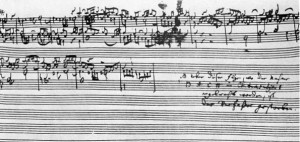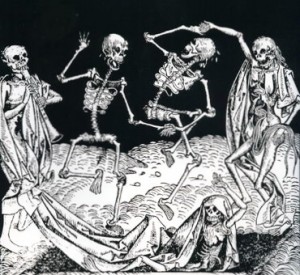Brahms left slim pickings for the musical grave-robber. He composed in his head, not in a notebook – directly to his C:\\, as it were.
Brahms also burned his sketches – reducing PhD candidates to tears. He also admitted to destroying dozens of completed works that fell short of his own exacting standards.
Sibelius, too, left behind few bone fragments, though there was a minor rattling in 2011 when a partial skeleton for the ‘lost’ Eighth Symphony was pieced together. Listen to these lean, mysterious, if tantalizing Sibelius fragments here.
Benjamin Britten, on the other hand, flung open the cemetery gates with a staggering 800 pieces of juvenilia he himself exhumed. Now, almost a half century after his death, they’re still tinkering with the BTC (Britten Thematic Catalogue) numbers in the Red House in Aldeburgh, whenever they come across a fresh work that Ben wrote in the cradle.
Britten’s contemporary and sometime friend, Dmitri Shostakovich, is receiving similar loving curatorial treatment. Moscow’s DSCH publishing house threatens 150 hard-cover volumes of the new collected works, 25% of which are previously unpublished, including “more than a hundred lesser know, or unpublished works by the composer.” The Brentano have pounced on one of these – what’s believed to be an abandoned draft for the first movement of his Ninth Quartet – and set composer Stephen Hartke to work exploring what he refers to as ‘a sense of disquiet and emotional preoccupation’ that underlines Shostakovich’s recently unearthed musical fragment.
Many musical corpses have remained unburied for centuries. Take Schubert’s Unfinished Symphony. If the title alone (not Schubert’s) does not present a sufficiently provocative challenge to the musical antiquarian, Schubert’s sketches for a third movement are irresistible. I recall interviewing English pianist Frank Merrick in the early Seventies about the 1928 Columbia Gramophone Company competition, which he won, to ‘finish’ the Unfinished. [I felt there was more of a story in Merrick’s many songs to Esperanto texts at the time, but the Schubert story was wanted by those who paid the bills]. Twenty years later, another interview, same story – finishing the Unfinished – this time when Brian Newbould brought his Schubert ‘realisations’ to the Festival of the Sound (including the Schubert quartet fragment, D.703 that the Brentano’s program will re-examine).
As though to tie a bow on Gustav Holst’s seven-movement suite The Planets, one neat-freak composer added a planet to Holst’s astrological fantasy to include Pluto (Colin Matthews: Pluto the Renewer) – which became a questionable inclusion for programmers once Pluto was down-sized to ‘dwarf’ planet. Elgar’s sketches for his Third Symphony fared better with the splendid posthumous creative collaboration of English composer Anthony Payne.
 ‘At the point where the composer introduces the name B-A-C-H in the countersubject to this fugue, the composer died,’ wrote his son Carl Philipp Emanuel (above) on the manuscript. The Brentano will perform Gubaidulina’s intense, often searing meditation on the incomplete fugue from The Art of the Fugue which rises in intensity as the music climbs ever higher on all four instruments.
‘At the point where the composer introduces the name B-A-C-H in the countersubject to this fugue, the composer died,’ wrote his son Carl Philipp Emanuel (above) on the manuscript. The Brentano will perform Gubaidulina’s intense, often searing meditation on the incomplete fugue from The Art of the Fugue which rises in intensity as the music climbs ever higher on all four instruments.
The half-dozen fragments that the Brentano are bringing would grace either half of a string quartet program by themselves – even without the new works they have inspired. Of the oldies, only the Bach (the final, incomplete Contrapunctus from The Art of the Fugue) – and not even the Haydn (his final quartet, Op. 103) – has been played previously for MusicTORONTO.
 ‘Hin ist alle meine Kraft, alt und fehwach bin Ich’ – ‘Gone is all my strength,old and weak am I.’ Haydn published the two movements of his final quartet with these words by way of an apology. They also appeared on his calling card (above).
‘Hin ist alle meine Kraft, alt und fehwach bin Ich’ – ‘Gone is all my strength,old and weak am I.’ Haydn published the two movements of his final quartet with these words by way of an apology. They also appeared on his calling card (above).
The Josquin and Dufay, too, are receiving their MT premières, deeply buried in a new score by American Charles (‘All my composing life, I’ve done things with and to old music’) Wuorinen. The Schubert and Mozart are both discarded quartet movements. American composer Vijay Iyer took up the challenge of dancing on the grave of the latter: “I get laughed at whenever I tell anyone that I’m finishing an unfinished Mozart string quartet,” he reports.
Brentano Quartet – Fragments: Connecting Past and Present.
Fragments by Schubert, Bach, Haydn, Shostakovich and Mozart. New works inspired by them by Wuorinen, Adolphe, Gubaidulina, Harbison, Hartke and Iyer. Thursday September 13, 2012 – 8:00 pm. Jane Mallett Theatre, St. Lawrence Centre for the Arts, 27 Front Street East, Toronto
© copyright Keith Horner 2012

